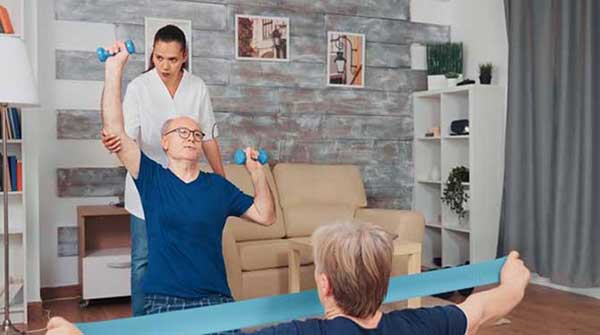Many aging adults are at risk of developing dementia due to genetics and lifestyle habits. A Biomarkers and Nutritional Food Metabolomics Research Group study found that a diet rich in plant products reduces the risk of cognitive impairment and dementia in the elderly.
If your loved one is showing signs of dementia or Alzheimer’s, you can take measures to slow down the progression of those neurodegenerative diseases. Although you cannot reverse any form of dementia, you can take measures to stop your family member’s cognitive deterioration.
Seek Professional Care
Consulting a professional retirement home will ensure that your family member receives specialized care. Look into care homes for dementia patients where your loved one can age in place. When a senior resides in a home-like environment among registered nurses, they are likely to lead a healthy lifestyle that will positively impact their cognitive behavior.
When your loved one receives care 24/7, there are fewer health risks. Sometimes, dementia symptoms can escalate and lead to significant problems when an aging adult lives alone. Living in a vibrant community surrounded by people will ensure that your family member doesn’t feel lonely.
Take Measures to Change Their Diet
Many foods affect the body, while some are negative, and others are positive. A diet rich in plant products is likely to help an individual’s cognitive function, so an aging adult must maintain a steady diet. Encourage your loved ones to eat more fruits, vegetables, and other plant-based products. If you cannot keep an eye on what they eat, moving them into a dementia care home can be particularly helpful as the staff members can control their diet.
Along with consuming certain foods, it is also vital to avoid foods that could trigger neurodegenerative diseases. A study published in Neurology found that a high pro-inflammatory diet can pose risks for dementia and cognitive impairment in later life. High pro-inflammatory foods include fried items, fatty meats, and commercially baked goods.
Encourage Them to Stay Active
Staying physically active can help the brain function more effectively. Besides improving a senior’s mood, exercise helps keep their muscles, joints, and hearts in good shape. However, when you encourage physical activity, ensure that the activity isn’t too strenuous for the individual. You can supervise them until they are familiar with the activity and comfortable doing it alone.
Credit: DCStudio Via Freepik
It is easier to stay active when others perform similar activities for motivation. Living in a retirement home allows the senior to partake in physical activities with other adults and feel more enjoyable.
Show Unconditional Support
Living with dementia is a challenging process for any senior. In addition to providing them with all the resources they require to lead a healthy life, lend them a hand and guide them through the process of adjusting to a new life. Any form of dementia can be a life-alerting event, so your loved one will need your support.
This content is a joint venture between our publication and our partner. We do not endorse any product or service in the article.




